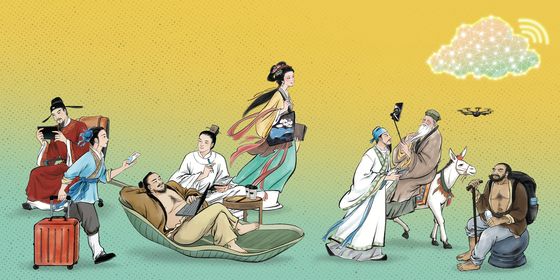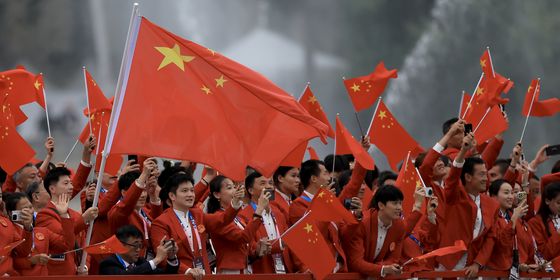The handbook on humblebragging in Chinese
“While eating hot pot, my friend suggested we text ‘Are you busy?’ to our boyfriends to see whose responds more quickly. Hers replied within seconds, while I got no response,” Beijing-based author Meng Qiqi wrote on Weibo in November.
“After 15 minutes, though, my friend suddenly let out a cry. My boyfriend was walking toward me, saying, ‘I’m here.’ By the way, it was just 15 minutes from my house to the hot pot restaurant.”
This now viral anecdote has been dubbed by netizens as a masterpiece of “Versailles literature (凡尔赛文学 Fán’ěrsài wénxué),” and Meng the “Queen of Versailles (凡尔赛女王 Fán’ěrsài nǚwáng).” This new literary genre is the Chinese equivalent of the “humblebrag”—messages on social media that appear to be complaints, but are really meant to show off the writer’s economic status, achievements, or good taste.
The term “Versailles” was named one of the top ten buzzwords of 2020 by Yaowen Jiaozi, an influential entertainment magazine. The first half of the term was inspired by the Japanese manga The Rose of Versailles, which portrays the decadent lives of French royalty.
But it is the arguably “literature” portion that sets “Versailles writers (凡尔赛人 Fán’ěrsàirén)” apart from the ordinary braggarts and posers on the internet. According to Weibo user Xiao Naiqiu, who is credited with coining the term, Versailles works must follow a sophisticated set of rules in order to show off without making it obvious. “I just want to use this term to mock Versailles writers, as they undoubtedly want to use a simple and unpretentious term to express their superiority,” wrote Xiao Naiqiu.
According to “Versailles experts (凡学家 Fánxuéjiā),” as Xiao Naiqiu and her followers are known, anyone can become a proficient fan’ersai writer by mastering a few simple rules. Take the following test—if you want to wax Versailles on a new addition to your garage, which should you write?
A. My husband bought me a Lamborghini. It costs more than 3 million.
Wǒ lǎogōng gěi wǒ mǎi le yí liàng Lánbójīní, yào sānbǎi duō wàn ne.
我老公给我买了一辆兰博基尼,要三百多万呢。
B. My husband bought me a Lamborghini, but the color is so ugly. Straight men are so tacky.
Wǒ lǎogōng gěi wǒ mǎi le yí liàng Lánbójīní, kěshì yánsè hǎo chǒu o, zhínán zhēnde tǔ.
我老公给我买了一辆兰博基尼,可是颜色好丑哦,直男真的土。
C. My husband bought me a Lamborghini. It looks fabulous in my mansion.
Wǒ lǎogōng gěi wǒ mǎi le yí liàng Lánbójīní, fàng zài wǒ jiā háozhái li kě zhēn piàoliang.
我老公给我买了一辆兰博基尼,放在我家豪宅里可真漂亮。
The answer is B. The essence of Versailles literature is that you must pretend to be humble, meaning not telling everyone the price of your Lamborghini, or that you own a mansion. Instead, make yourself seem unlucky by complaining about the color of the car, but really drawing attention to the expensive wheels (or rich and caring husband).
But just humbling oneself is not enough. True Versailles mastery is a balancing act between high and low, subtle and crude. The following sentence is a good beginner effort, but won’t please the toughest critics:
Today I found a red envelope I received last Chinese New Year tucked in a book, with 5,000 yuan inside. I’m so stupid that I can even forget money inside of books!
Jīntiān zài shū li zhǎodào yí gè guònián shōu de hóngbāo, lǐmiàn yǒu wǔqiān kuài qián. Wǒ hǎo chǔn, jìngrán shū li jiā qián dōu néng wàng!
今天在书里找到一个过年收的红包,里面有五千块钱。我好蠢,竟然书里夹钱都能忘!
This sentence excels in putting down oneself, but simply finding cash is too banal for a Versailles lifestyle. The sentence is also missing a technique known as the “third-person perspective”—that is, praise that is attributed to others. Finally, it’s not wordy enough to be a true fan’ersai, compared to the alternative below:
While reading an early work of Nobel Prize winner Mo Yan today, I accidentally found a red envelope containing 5,000 yuan…Though it was small change, just a meal for me, am I really so absentminded? My friends always praise me for being smart, but after this, I’m starting to question my intelligence.
Jīntiān dú Nuòbèi’ěr wénxuéjiǎng huòdézhě Mò Yán de zǎoqī zuòpǐn de shíhou, yìwài fāxiàn yǐqián jiā lǐmiàn de hóngbāo, yǒu wǔqiān kuài qián…suīrán zhǐshì xiǎo qián, yí dùn fàn éryǐ, dàn wǒ zhème cūxīn de ma? Péngyou hái zǒng kuā wǒ cōngming, zhēn wèi zìjǐ de zhìlì zhuōjí.
今天读诺贝尔文学奖获得者莫言的早期作品的时候,意外发现以前夹里面的红包,有五千块钱……虽然只是小钱,一顿饭而已,但我这么粗心的吗?朋友还总夸我聪明,真为自己的智力捉急。
Advanced Versailles writers are known for another trick: the Reply All. This is when one doesn’t bother replying individually to the comments under a Versailles-esque message, but writes a comment meant for all readers—usually prefaced by the words “Reply to all” for extra attention—to continue the bragging:
Speechless. I had no time to put on makeup before going shopping today, so I wore my GM sunglasses. A girl thought I was Anne Hathaway and asked for my autograph. So embarrassing!
Hǎo wúyǔ, jīntiān chūqù guàngjiē méi láidejí huàzhuāng, suíbiàn dài le yí gè GM de mòjìng, yǒu ge xiǎo mèimei bǎ wǒ rènchéng le Ānní·Hǎisèwēi, hái pǎolái zhǎo wǒ yào qiānmíng? Gāngà sǐ le.
好无语,今天出去逛街没来得及化妆,随便带了一个GM的墨镜,有个小妹妹把我认成了安妮·海瑟薇,还跑来找我要签名?尴尬死了。
Reply to all: The sunglasses were a licensed model, about 2,000 yuan, so not that expensive. The main reason I wore them was because I lost my Hermès ones.
Tǒngyī huífù dàjiā: Mòjìng shì liánmíngkuǎn, liǎngqiān duō, yě bú guì, zhǔyào shì Hermès de nàge diū le, suǒyǐ jīntiān jiù dài le zhège.
统一回复大家:墨镜是联名款,两千多,也不贵,主要是Hermès的那个丢了,所以今天就戴了这个。
After learning the laws of Versailles literature, one only has to imitate and practice. In fact, after the term 凡尔赛文学 started to trend, Chinese netizens realized that many celebrities have been doing this for years. Jack Ma, China’s richest man, once said he regretted starting his e-commerce empire Alibaba because it took time away from his other interests:
The biggest mistake of my life was starting Alibaba. I didn’t think it would completely change my life.
Wǒ rénshēng zhōng zuì dà de cuòwù jiùshì chuànglì le Ālǐbābā, wǒ cóng méi xiǎngguò Ālǐbābā huì chèdǐ gǎibiàn wǒ de shēnghuó.
我人生中最大的错误就是创立了阿里巴巴,我从没想过阿里巴巴会彻底改变我的生活。
Likewise, TV host Sa Beining said in an interview that he had been distressed to get an offer of admission from Peking University as a young man—referring to himself as a “Beijing migrant” (北漂 Běipiāo), a term usually associated with low-wage workers, and saying his top-ranked alma mater was just “okay”:
My Beijing migrant life was different from that of others, since I was forced into it by being admitted to Peking University without an entrance exam [due to high grades]. I was really conflicted when I got the offer—go, and leave my family and friends, or stay; but then, Peking University was okay.
Dāngrán wǒ de Běipiāo hé hěnduō Běipiāo de rén bù yíyàng, yīnwèi wǒ shì bèipò Běipiāo, yīnwèi dāngnián ne, bǎosòng Běidà le. Wǒ dāngnián nádào lùqǔ tōngzhīshū hěn jiūjié, qù ba, yuǎnlí jiārén, xiǎohuǒbàn, bú qù ba, Běidà yě hái kěyǐ.
当然我的北漂和很多北漂的人不一样,因为我是被迫北漂,因为当年呢,保送北大了。我当年拿到录取通知书很纠结,去吧,远离家人,小伙伴,不去吧,北大也还可以。
Even historical figures were not exempt. Netizens have noted that Li Bai (李白), a famous poet in the Tang dynasty (618 – 907), wrote in his “Night Trip in Gulang”:
When I was young, I didn’t know what the moon was/ I called it a white jade plate.
Xiǎoshí bù shí yuè, hūzuò bái yùpán.
小时不识月,呼作白玉盘。
White jade plates were extremely valuable in the Tang dynasty, and it was almost impossible for a child to have seen one unless they were born in a wealthy family. Li Bai was a 富二代 (fù’èrdài, rich scion) and a humble-braggart 1,200 years before the internet!
Versailles literature is not new. Popular online novels and films in the last decade, such as Guo Jingming’s Tiny Times franchise, are infamous for portraying young adults with unrealistic living standards and a habit of name-dropping luxury brands in conversation. Xu Yan, a psychology professor at Beijing Normal University, told Southern Weekly that materialism has changed the way young Chinese express themselves. “People use brands to measure each other’s status, so cars are no longer a means of transportation, but indicate status and one’s identity.”
The “Versailles Literature Study Group” on social media platform Douban, where Versailles experts dissect examples of fan’ersai on the internet, notes in its self-introduction: “The study and imitation of Versailles literature can be a way of poking fun at the humblebragging that invades our daily life…most people do not ridicule Versailles writers directly, but are passively troubled by their flaunts.” Therefore, it’s clear many Chinese netizens don’t like this way of showing off.
There are also those who claim to be reformed ex-fan’ersai, who stopped flaunting themselves because it did not make their social life better. A member of the Douban group wrote: “I’ve realized I used to be a Versailles writer, cultivating a hypocritical, feel-good image. Now I don’t put so much energy into social media. It feels better.”
Gilded Expressions is a story from our issue, “You and AI.” To read the entire issue, become a subscriber and receive the full magazine.












